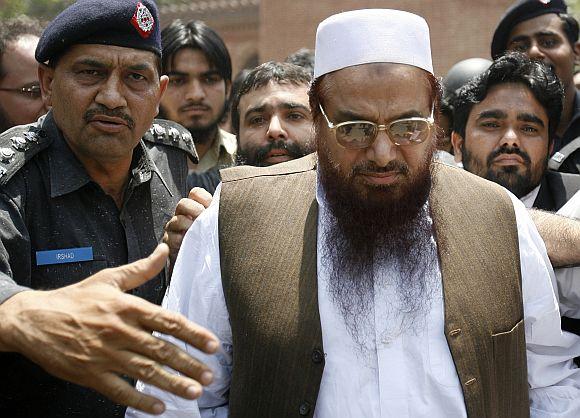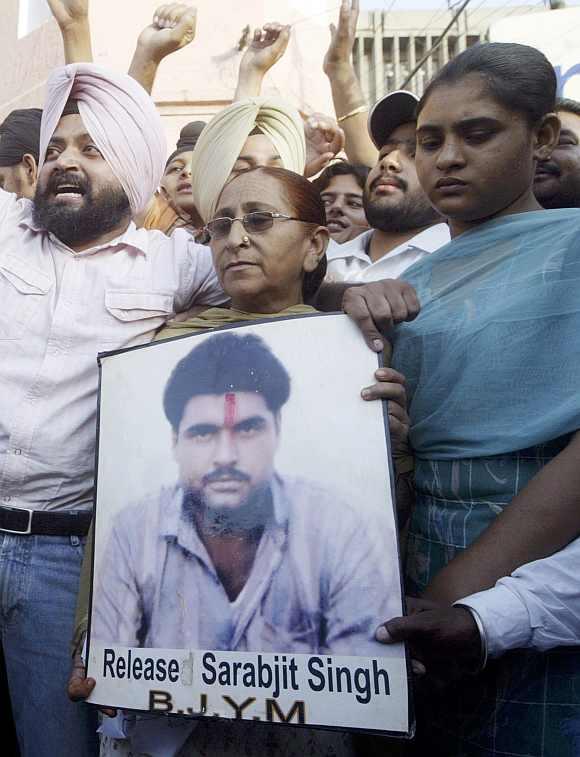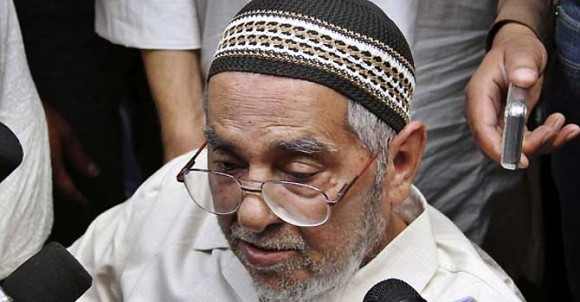
The Lashkar-e-Tayiba terrorist has warned the Pakistan government not to release Sarabjit Singh because he was a RAW agent sent on a mission to conduct bomb blasts, reports Amir Mir.
Lashkar-e-Tayiba founder Mohammad Saeed has opposed Pakistan President Asif Ali Zardari's reported intention to release an Indian national, Sarabjit Singh.
Singh was sentenced to death for his alleged involvement in the 1990 serial bomb blasts in Lahore and Multan that killed 14 people.
Saeed insists that Sarabjit Singh is an Indian spy like Kashmir Singh, who had pleaded innocence and later confessed to being a Research & Analysis Wing agent upon his release by the Pakistan government in March 2008.
Saeed -- who is wanted by America's Federal Bureau of Investigation and India's Central Bureau of Investigation -- made these observations in Lahore when asked to comment on Pakistan Ambassador to the United States Sherry Rehman's May 27 tweet that Pakistan would release next week the alleged Indian spy who has been held in a Pakistani prison for the last 22 years.
Rehman tweeted that the new relationship between Pakistan and India would be strengthened after the release.
While Saeed and others in Pakistan thought Rahman was referring to Sarabjit Singh, officials at Pakistan's interior ministry insist that the ambassador in fact referred to Surjeet Singh, another Indian national who has been languishing in Lahore's Kot Lakhpat jail for the last 30 years.
Surjeet Singh was arrested in 1982 on charges of spying and given a death sentence by the commanding officer of the 106 Brigade Headquarters, Lahore Cantonment.
Please ...

'Sarabjit Singh's likely release does not hold any guarantee for improvement in ties with India,' Mohammad Saeed said, adding that a bilateral dialogue should focus on 'real issues'.
Saeed feels Sarabjit Singh's release could again embarrass the Pakistan government as had been the case after Kashmir Singh's release.
Kashmir Singh, who spent 35 years in Pakistani prisons, was released after being granted a pardon by then president Pervez Musharraf in 2008.
After he arrived in India, Kashmir Singh addressed a press conference in Chandigarh and claimed that he was indeed an Indian spy.
Kashmir Singh's admission embarrassed Musharraf and prompted the general to reject Sarabjit Singh's mercy petition on March 5, 2008, believing a reprieve for a person convicted of terrorist attacks would further stir public sentiment.
Sarabjit Singh, who was convicted in 2006 for his involvement in the 1990 serial bomb blasts, continues to plead his innocence. He says he is a poor farmer who is a victim of mistaken identity having strayed into Pakistan from his village located near the border.
Sarabjit Singh's execution has repeatedly been postponed by President Zardari, who is set to give his decision on the convict's fresh clemency appeal.
Please ...

In his fifth mercy petition which has been signed by 100,000 Indians, Sarabjit Singh urged President Zardari to reciprocate the recent release of Pakistani national Dr Khalil Chishti by the Indian government.
Attached with Sarabjit Singh's petition are two letters addressed to Zardari from the chief cleric of Delhi's Jama Masjid, Syed Ahmed Bukhari, and the caretaker of the shrine of the Sufi saint Khwaja Moinuddin Chishti, Syed Muhammad Yamin Hashmi.
In his letter to the Pakistan president, Bukhari pointed out that Sarabjit Singh's sister Dalbir Kaur had met him personally and provided vital evidence which proved the latter's innocence.
'Sarabjit Singh should be freed on humanitarian grounds, which will not only help in promoting goodwill between the two neighbours, but will also result in promoting communal harmony among Sikhs, Hindus and Muslims of India,' Bukhari wrote.
According to Sarabjit Singh's counsel, advocate Owais Sheikh, his client also gave a two-page letter to be sent to Zardari.
"I have forwarded both the petition and the letter to President Zardari, with hopes of good news coming from the presidency, especially after the Indian court's recent decision to release an ailing Dr Chishti, which has rekindled hopes for Sarabjit Singh," Owais Sheikh added.
Dr Chishti had come to India in 1992 to visit his ailing mother where he was implicated in a murder case. After an 18-year trial, the octogenarian virologist was awarded life imprisonment and sent to Ajmer jail in January 2011, before being released in April this year and allowed to return to Pakistan by India's Supreme Court, mainly on humanitarian grounds.